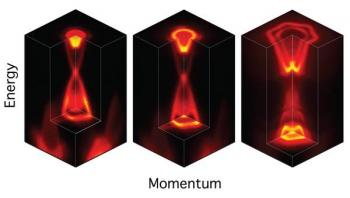Electron spin-splitting effect (Rashba effect) was demonstrated in a semiconductor (Bismuth selenide) that is far larger than has ever been seen before. This could lead the way towards room-temperature spintronic devices. The Rashba effect is the phenomenon of spin splitting with an applied electric field instead of a magnetic field.

The Rashba effect is crucial for spintronic devices: for example when designing spin transistors, electrons of a single spin are injected and then â under an applied electric field â have their spins rotated. Rashba effect in well-established semiconductors (silicon or gallium arsenide for example) is very small - and so electrons have to travel large distances before any spin rotation is noticeable. This requires very pure materials and very low temperatures.
The new discovery is a material that could make the Rashba effect feasible at room temperature - Bismuth selenide. This material is unusual in that its inner bulk structure behaves as a semiconductor while its surface behaves as a metal (it's a topological insulators). The bismuth-selenide sample exhibited an amount of spin-splitting at least 10 times better than other semiconductors, and at temperatures above 100 °C.